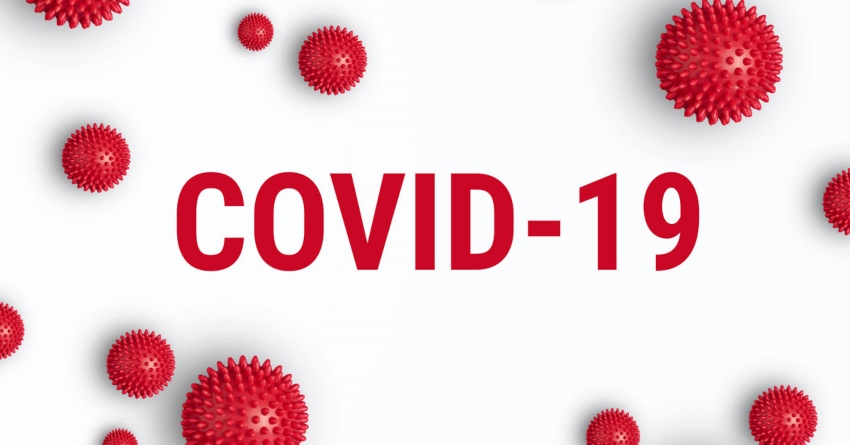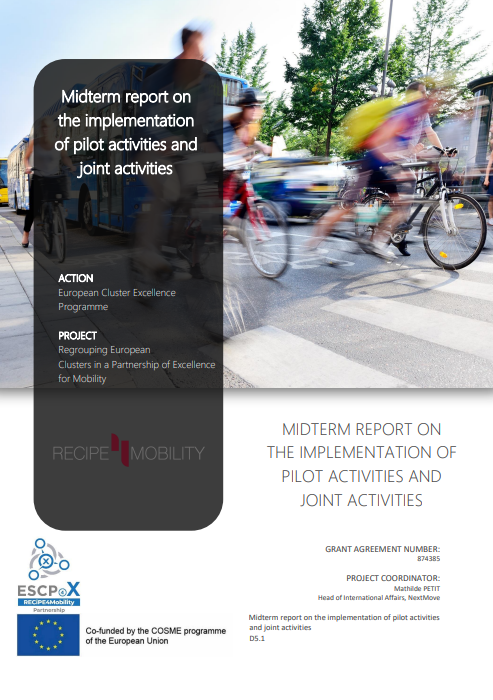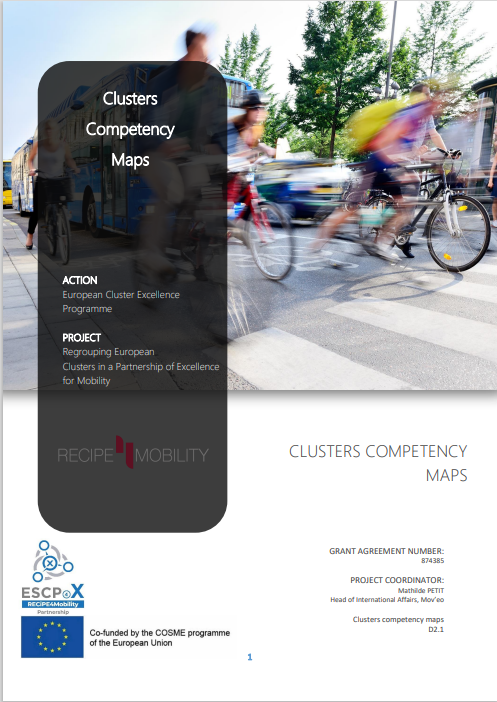
Kick-off of RECiPE4Mobility Project
Maio 19, 2020
UMI Communication Material
Junho 25, 2020Executive summary
Faced with the COVID-19 crisis, RECiPE4Mobility consortium exchanged views on the actions that each cluster could put in place to:
- relay as widely and clearly as possible the political measures adopted to support companies affected by the crisis.
- encourage the involvement of their members in the fight against the virus.
Then, all the Partners:
- shared the relevant governmental measures on a collaborative document, on their website and informed their members by email.
- used this collaborative document to have the same information at the same time regarding EU R&I actions on Covid-19, so that they provide consistent information to their members located all over Europe.
Finally, a specific folder was created on RECiPE4Mobility internal communication platform in order to gather relevant analyses and feedbacks regarding the impact of the Covid-19 crisis.
RECiPE4Mobility’s consortium actions on Covid-19
Our clusters all have the support of their members at the heart of their mission, which is particularly important in these difficult times. The RECiPE4Mobility consortium has worked hard to learn about their situations and needs, to provide them with all the necessary information in real time, and to provide them with exceptional services to facilitate business continuity.
We all shared the difficulties and concerns our members are facing in this unprecedented period. They sometimes have to cope with the total interruption of business within their companies or with suppliers. On the demand side, markets are closing and reopening at different times, creating great uncertainty and suggesting that the full recovery of activity will be slow and gradual. That is why some of our members are facing short-term financial problems, and the expenses are piling up: salaries, rents, credits… In addition, it is
particularly difficult for SMEs to find their way around the multiplication of economic support measures, and adapting to remote working can sometimes be tricky
Faced with this emergency situation, which is both economic and health-related, the mission of our clusters is more than ever to be at the side of our members and to assist them, both to ensure the maintenance of their activity in the short term, and to maintain their projects and their willingness to innovate in the medium and long term. The very nature of our organisations gives us the agility that is essential in these uncertain times. Moreover, clusters act as a transmission belt, as they are privileged interlocutors both for national and local public authorities and for their very broad territorial networks, composed of large companies, SMEs and start-ups.
First of all, the priority of our clusters has been to provide immediate support to our members. That is why we have made it a priority to keep in touch, both by phone and by e-mail, and to listen to their individual difficulties. This has been a much-appreciated initiative, which demonstrates the importance of clusters as a federating ecosystem.
In addition, information and help to find their way in the economic and financial support schemes has obviously been a key point in our short-term action. We have put forward information as regularly as possible so that companies and their employees are aware of the steps to be taken to protect themselves as well as possibly resume activity in optimal sanitary conditions.
As one of our top priorities is to provide excellent services to our members, tailored to their immediate needs and future ambitions, we have adapted our offer. We have encouraged our members to commit themselves as much as possible in response to the crisis, for example in the supply of masks and the development of innovations to make respirators available, for example. This has been done in several ways, for instance by accompanying them towards special Covid calls for proposals.
Moreover, this crisis context has particularly highlighted the need for cooperation between clusters on a European scale. The European Automotive Cluster Network (EACN) held a meeting on this topic in April 2020, and Mov’eo and Mobinov attended. We have defined working groups, which aim to work on the future landscape of the automotive industry, the role of clusters faced with the crisis, and the means to provide answers to companies’ financial difficulties. It is indeed crucial that innovation remains at the heart of the automotive growth strategy and that the interests of this sector, which is vital to Europe’s technological and industrial excellence, are preserved.
Above all, collaboration between clusters has been particularly intense in the framework of the European project RECiPE4Mobility, where each cluster has shared its individual initiatives, the main ones of which are mentioned below.
AUTOMOTIVE NL surveyed their partners to better understand their situation and know their needs. Then, the cluster set up a dedicated page, which brings together relevant governmental measures and its positions on economic recovery. Automotive NL also organized with PwC a webinar regarding the implications of Covid-19 for the automotive industry.
E-MOBILITY cluster has done the same thing, and the breakfast on “Quo vadis powertrain – Challenges in a disruptive market ?” quickly turned into a webinar with 40 participants.
For its part, MOBINOV is building a plan to support the Portuguese automotive industry, based on its partner contributions, and launched mailing and social media campaigns to share information.
Furthermore, MOV’EO set up a dedicated webpage gathering health & business continuity information, national and regional support measures, in addition to useful links. Then, the cluster surveyed its members to measure the economical and societal impact of the Covid-19 crisis. Moreover, MOV’EO has been providing a panel of free services which are usually paid for (communication services, coaching on strategy…) and provided a Support to project proposals, for the special Covid crisis innovation calls (at national and regional level). The cluster is in continuous discussion with regional and national authorities as the representative of the industrial
actors.
Likewise, ZONE cluster has held online strategic meetings and shared information to their members, and adapted its services taking into account the constraints related to the Covid crisis.
As RECiPE4Mobility’s core target is to join forces and pool the best of our expertise to provide always better services to our members, the lessons and consequences of the crisis will obviously be at the heart of the activities that the project will carry out for 2 years. The ability to adapt to this type of health situation that could occur again will be an important part of the development of cluster management skills, cluster strategy and learning that we tackle in WP2. We will for instance discuss the content of coaching sessions to meet those needs. Our clusters could reflect regarding the impact of the crisis on the long-term mobility trends, maintaining links between large groups and SMEs / start-ups in times of a crisis, reindustrialization in Europe or Artificial Intelligence potential to cope with health crises. Likewise, in the framework of the ClusterXchange pilot, the response to financial and HR difficulties in time of a crisis will obviously be a major concern for SMEs, scaling-up support organizations and cluster managers.
Covid-19 Industrial Clusters Response Portal
This webpage has been created to facilitate the interaction of the industrial cluster community to allow fast and direct responses within the community itself too. Its objective is twofold:
- Serve as a one-stop shop where reliable information can be found on actions and decisions of the European Commission for industry and especially industrial clusters.
- Support an open discussion forum where actors can share their experiences, solutions, requests and questions.
In addition, the European Commission has set up a mailbox to centralize questions and offers from companies wishing to get involved in the fight against Covid-19: EU-COVID19-OFFERS-TO-ERCC@ec.europa.eu
Member states actions on Covid-19
The commitment of our clusters is obviously part of a more global economic response at European Union and Member States level. That is why our clusters have shared the economic support measures adopted in their countries.
At the European level, the governments agreed a 540 billion € plan through the European Stability Mechanism to provide support to euro area members up to 2% of their 2019 GDP. In addition, the European Investment Bank will back companies and especially SMEs up to 200 billion €. The EU budget has also been mobilized up to 37 billion € and the Support to mitigate Unemployment Risks in an Emergency (SURE) fund has been set up and will protect workers and jobs with expenses up to 100 billion €. Finally, the European Central Bank has launched asset purchases of 120 billion € until the end of the year, and an additional Pandemic Emergency Purchase Program up to 750 billion €.
France has overall committed 110 billion euros (5% of GDP) to bank loan guarantees, credit reinsurance schemes, health insurance for the most vulnerable, while social security and tax payments have also been postponed. The short-time work scheme will amount to 24 billion €.
Germany endorsed a supplementary budget of 156 billion € that includes guarantees for short-time work and 50 billion € grants for SMEs. In addition, the creation of an Economic Stabilization Fund (WSF) and the commitment of the Public development bank KfW will provide an additional 757 billion €. On the other hand, Landers adopted measures up to 48 billion € and a total of 63 billion € loan guarantees.
Hungary announced an Anti-Epidemic Protection Fund and an Economy Protection Fund to protect jobs and to support particularly affected sectors like tourism, health, agriculture and transport. Furthermore, 0.6% of the GDP has been reallocated to healthcare. On the monetary side, Hungary suspended sanctions for unmet reserve requirement.
Netherlands offers a compensation of up to 90% of wages for companies that will lose at least 20% of their turnover due to the crisis. A special attention has been paid to public guarantees for SME loans and sectors such as hospitality, travel and agriculture. The tax deferrals amount to 35-45 billion €.
Portugal will strive to protect jobs through 1 billion € expenses per month devoted to short-time work, and guarantees for SMEs up to 3.7 billion €. A particular attention is paid to the situation of the most vulnerable, and especially the self-employed affected by the virus, people who need to take care of their children, and people sick or in isolation. Tax deferrals amount to 6.2 billion €.
Sources: IMF Policy Tracker 1




